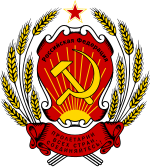Congress of People's Deputies of the RSFSR
|
Congress of People's Deputies of the Russian SFSR Congress of People's Deputies of the Russian Federation Съезд народных депутатов РСФСР Съезд народных депутатов Российской Федерации |
|
|---|---|
|
(up to 25.12.1991, named the Russian SFSR) |
|
 |
|
| Type | |
| Type | |
| History | |
| Established | 1990 |
| Disbanded | 1993 |
| Seats | 1,068 (at highest point) 638 (attended X (Emergence) Congress) |
| Elections | |
| Plurality voting system (direct elections via single-member districts) | |
|
Last election
|
4 March 1990 |
| Meeting place | |
 |
|
|
White House (X Congress) Grand Kremlin Palace (I-IX Congresses) |
|
The Congress of People's Deputies of the Russian SFSR (Russian: Съезд народных депутатов РСФСР) and since 1991 Congress of People's Deputies of the Russian Federation (Russian: Съезд народных депутатов Российской Федерации) was the supreme government institution in the Russian SFSR and in the Russian Federation from 16 May 1990 to 21 September 1993. Elected on 4 March 1990 for a period of five years, it was dissolved (without constitutional authority) by presidential decree during the Russian constitutional crisis of 1993 and ended de facto when the Russian White House was attacked on 4 October 1993. The Congress played an important role some of the most important events in the history of Russia during this period, such as the declaration of independence of Russia from the USSR (December 1991), the rise of Boris Yeltsin, and economic reforms.
The Congress had the power to pass laws by majority, which must then be signed by the President (with no right to veto until July 1991). The Congress held the ultimate power in the country (that is, power to decide on "any questions within jurisdiction of the Russian Federation") and some of the most-important powers (passage of and amendment of the Constitution, approval of the Prime Minister of Russia and the holders of the highest public offices, selection of the members of the committee of constitutional supervision (judges of Constitutional Court since 1991), declaration of referendums, impeachment of the president, etc.) were exclusive powers of Congress, exercised solely by it.
...
Wikipedia
